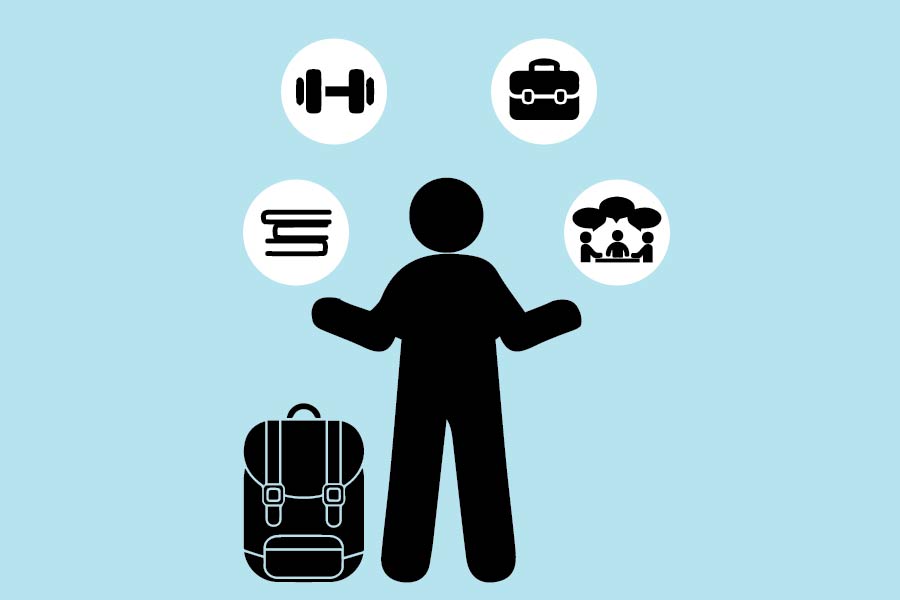
Making time for school, extracurricular activities, self-care
It is not unusual for college students to seek out employment and participate in extracurricular activities during the course of their collegiate careers. In fact, it is quite common for full-time students to engage in non-school related activities, which can include clubs and organizations, internships, Greek life, jobs and research positions. With such a varying list of obligations to tend to, some students find it difficult to manage their time accordingly.
Bailey Boka, a third-year genetics and genomics major, an employee at the Segundo Services Center, a member of Delta Gamma sorority and an intern at the MIND Institute, said that college is a prime time for students to branch out and explore different interests. Students thus have a desire to experiment with multiple extracurricular activities.
“I think that now is the time to find things that are interesting to you [to] see what you would want to do for your career,” Boka said. “I got an internship at the MIND Institute because it seemed like something I’d be interested in and would possibly like to pursue.”
With the costs of attending college at an all-time high and still continuing to soar, many students also choose to work one or more jobs while engaging in their studies. Boka decided to get a job to help alleviate current college expenses as well as the future costs of living.
“I decided to get a job to help out financially,” Boka said. “The cost of college is really hard on my parents, and I also have a younger sister who’s going to be in college next year. I knew that I really needed to start saving money to live off of after college.”
Other students seek out employment as a way to gain more work experience or just out of interest. Alix Mahon, a second-year human development major, a campus tour guide and member of Alzheimer’s Buddies, wanted to get a job to keep herself more actively involved on campus.
“I had a lot of gaps in between the day, and getting this job allowed me to fill in those gaps and make my day a little bit more structured,” Mahon said. “I liked the on-campus job because then I could work with my peers and get to know some more people on campus and make the community a little bit smaller.”
Trying to maintain adequate grades is difficult as is for some students, but having a job and actively participating in extracurricular activities can exacerbate the problem. Boka finds that trying to manage all of her different commitments can sometimes become too overwhelming.
“I would say that probably 25 to 30 hours out of the week [are dedicated to non-school related activities],” Boka said. “It can definitely be difficult to balance out work and school because sometimes, you have three midterms all in one week but you still have work and internships. It’s all a balancing act, and I feel like it can be hard to adjust to.”
In college, students often feel that time is only valuable if used efficiently. If students are not keeping themselves occupied every minute of every day, they are not maximizing productivity and are thus wasting precious time. This prompts students to take on heavier workloads, which sometimes prove to be more than they can actually handle.
Mahon believes that students can be productive without feeding into this mentality that the busier they are, the more efficiently they are using up their time. According to Mahon, students can achieve balance between work and leisure by allocating a certain amount of time in the day for things that make them happy.
“I think you can also have productive free time,” Mahon said. “A lot of productivity is measured by school work or actual work, but I think you also have to keep in mind that you need to be doing stuff for yourself. You can be productive by setting a time boundary where you can do other things besides work.”
Elisa Gomez is a first-year cinema and digital media major, a Coho employee, an upcoming board member of the Mujeres Ayudando La Raza and a member of the Adventist Christian Fellowship and Davis Christian Fellowship. Gomez believes that amid all the stress that builds up from trying to balance out their hectic schedules, it is imperative for students to take care of their minds and bodies.
“I don’t think the stigma [regarding self-care] is healthy,” Gomez said. “It’s always good to self-care, and I think that goes along with mental health as well. You need to make time for yourself, and sometimes that means just being alone or doing whatever you like instead of trying to do everything all at once. I like to keep myself grounded by making time to do stuff that I actually like to do.”
Written by: Emily Nguyen — features@theaggie.org



